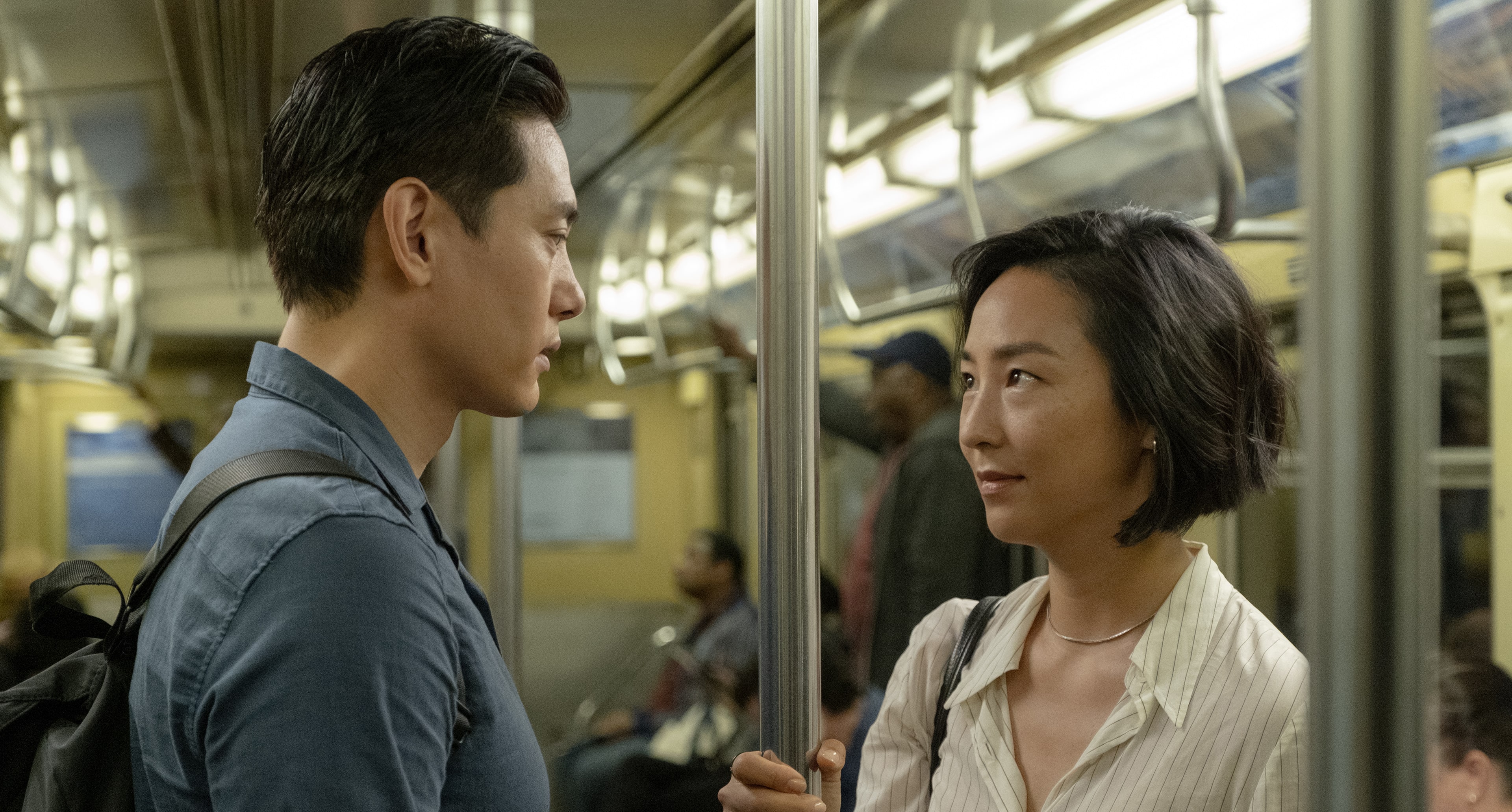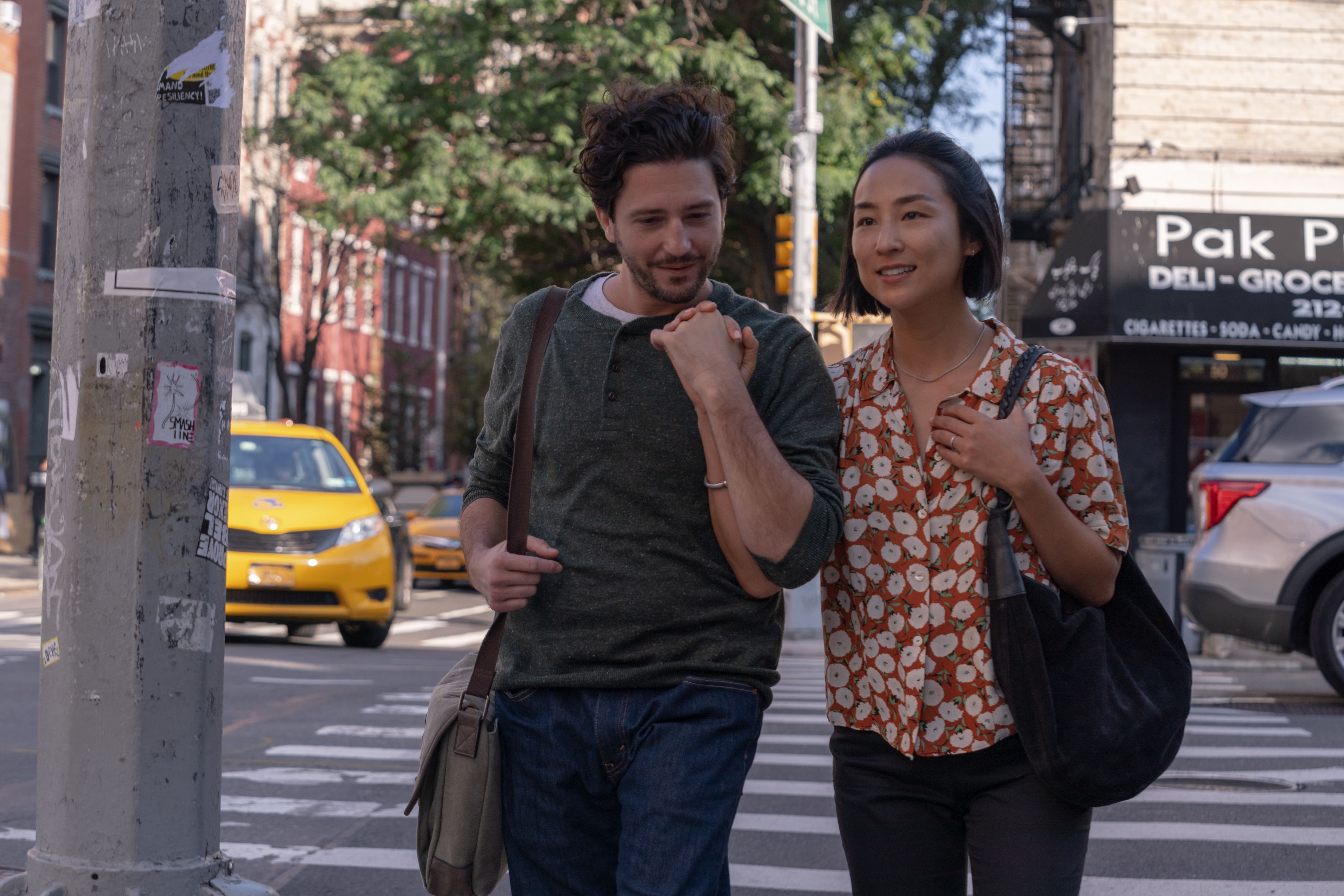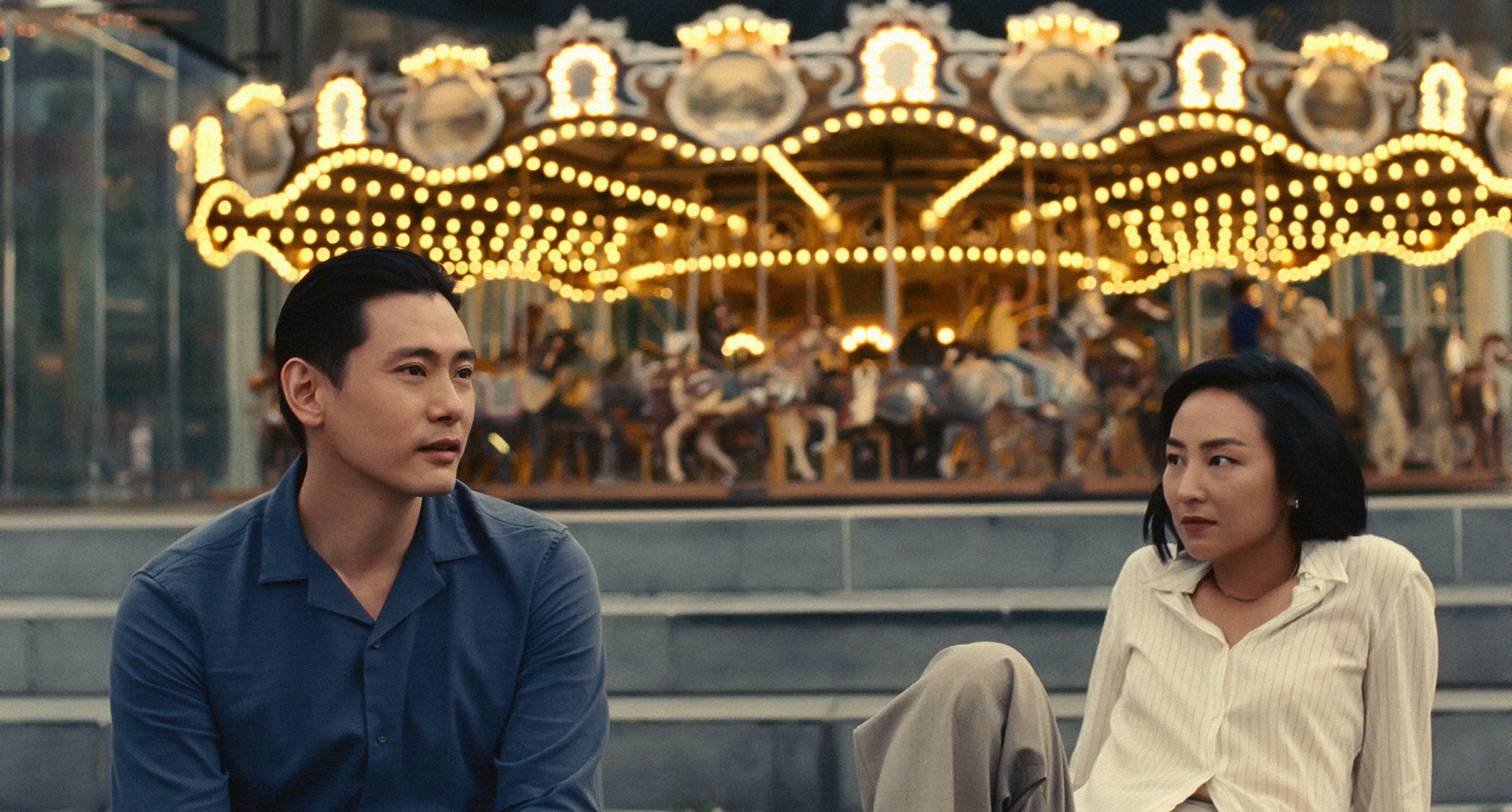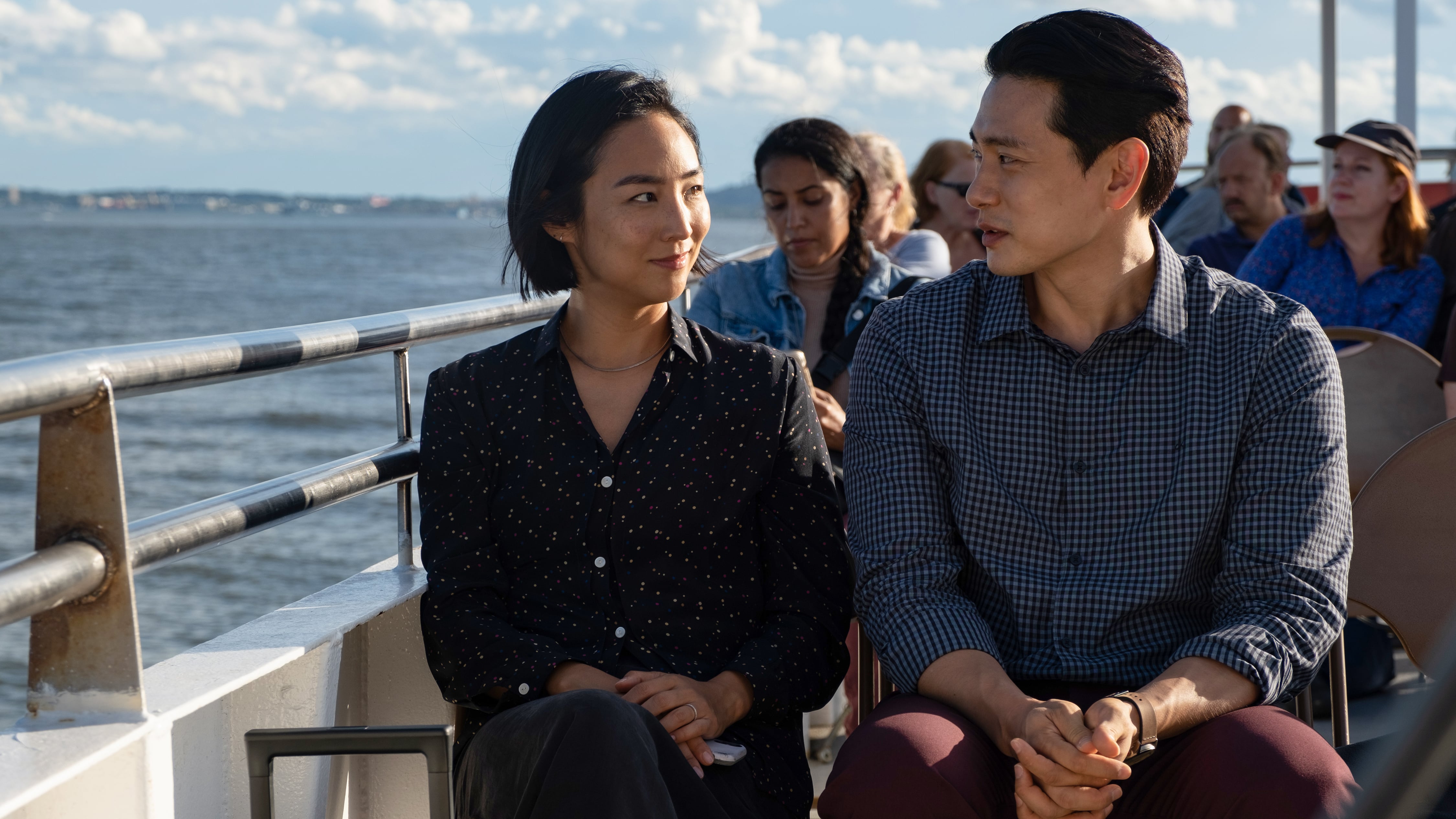Going to the movies right now feels like huffing exhaust. The fumes of tired franchises, hyperfrenetic filmmaking, and cheap sludgy visual effects choke multiplexes and streaming services, strangling creativity and our own good judgment.
But there are still rare clearings in the miasma, when a film can be a cleansing blast of the cleanest oxygen that reminds us why we love cinema in the first place — and what we could have if only we made different choices.
Past Lives, writer-director Celine Song’s debut feature, is that kind of work. A wise and exquisite film shot through with bold chances and achingly authentic performances, it’s a slow burn that begins with a deceptively simple foundation before crescendoing in an emotional wallop.
Twenty-four years after Nora (Greta Lee) emigrated from South Korea with her family, she reunites in New York with childhood sweetheart Hae Sung (Teo Yoo), both confronting what might have been, could be, and never will. If that sounds ho-hum it’s because, broadly speaking, we’ve seen this kind of story before — a reliable old saw storytellers have taken in countless directions. But in Song’s hands, it feels fresh and alive, an unpretentious grappling with fate, regret, and the waves churned up by our choices.
Song builds Past Lives around three key moments in Nora and Hae Sung’s story. The first, set in Seoul 24 years ago, establishes the relationship between the then-12-year-olds just as Nora (whose name in South Korea is Na Young) and her family leave for Canada. The second jumps ahead 12 years, to when Nora is a hopeful playwright in New York, Hae Sung is an engineering student in Seoul and the two find each other thanks to Facebook and Skype (and Hae Sung’s dogged determination).
(It’s worth mentioning that in the second chapter, set in 2011-12, Song tells Nora and Hae Sung’s reconnection entirely through glitchy Skype conversations. They never occupy the same physical space, and that Song gets so much emotional traction out of what we’ve been conditioned to believe is an impersonal, almost dehumanizing form of communication is a testament to her skills as a filmmaker and storyteller. It’s also the first great depiction of that time in our digital lives, which isn’t something I expected to find in this kind of film.)
The final act jumps another 12 years to the present, when Nora and Hae Sung finally reconnect when he visits Nora — who is now married to Arthur (John Magaro) — in New York. Each chapter builds on and reverberates against the other, subtly setting us up for its quietly shattering final moments.
This is only achieved because Lee and Yoo are so good here, both individually and together. They not only have to carry these characters over the expanse of time and memory, they are routinely required to run an emotional gamut within a single shot. And not all of it is interior. In the last chapter, Nora is as loose and breezy as Hae Sung is uptight and constricted; she flows through the frame like the breeze, and he occupies space (and clothes) as if it has him compressed like a vice. By the final moments, as they make peace with the past, she becomes a bit stiffer and he more fluid — two halves, so long missing, reintegrated, assuming aspects of the other and becoming more dynamic.
Song’s script does a lot of the heavy lifting on that score, but Lee and Yoo are ultimately the ones who get us fully invested in Nora and Hae Sung. When Hae Sung tells Nora that, for him, “you are someone who leaves” but to Arthur “you are someone who stays,” it hits with a force that only comes from feeling total empathy with these people. It’s impossible to imagine Past Lives with anyone else in the roles.
That, of course, is thanks to Song’s ability to draw these kinds of performances out. Indeed, with a single exception, Past Lives is a monument to her confidence — and quiet audacity — as a filmmaker. (The film opens with this strange eavesdropping framing device that never appears again and is never developed. It’s the only time you sense this is the work of a rookie feature director.) The simple maturity of the pacing and script are evidence of her command of craft. But just to prove how good she is, there are numerous shots in the film that run, uncut, for a minute or more: Nora and Hae Sung discussing their lives on the steps of Jane’s Carousel, in Brooklyn, or facing each other silently, deeply, in front of a blue garage door on the Lower East Side; Hae Sung and Arthur, sitting together at a cocktail bar, separated by an empty seat, where Nora had been, a chasm of language barriers and unease about each other’s place in Nora’s life.
These aren’t the showy one-shot spectacles of an Alfonso Cuarón film, nor do they wallow in the artifice to create discomfort or unease. They’re more like contemporary updates to Ozu and Wong Kar-wai, extended beats of catharsis and communion that come as conversational and relational capstones. The characters don’t want the moments to end, and we don’t, either. (Cinematographer’s Shabier Kirchner’s gorgeous work in these long takes — indeed, the whole film — certainly helps.)
I didn’t, at least. After watching sequel after sequel and franchise flick after franchise flick, all cut like coked-up music videos, my eyes and brain unable to focus on any one thing in a frame overstuffed with digital monstrosities for more than two seconds, it was luxurious to settle in with a quiet, rich, and assured piece of cinema. There are no fireworks in Past Lives, nor, for that matter, villains. It’s the exceedingly rare grown-up movie for grownups who live grown-up lives of hopes, anxieties, and compromises.
Song grapples with big ideas: why we are who we are, what we want out of life, who we want to spend our lives with. That kind of quiet profundity puts it at odds with where mainstream studio filmmaking is right now. But it makes it the perfect film for our post-pandemic moment. Its questions are ours — and we could use all the help we can get in finding answers.
Seeing Past Lives in a real-deal movie theater with a crowd of friends and strangers is as good a place as any to begin the journey.
Past Lives is now playing in theaters across the city.













